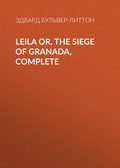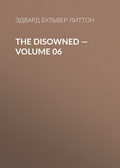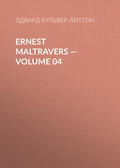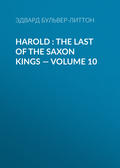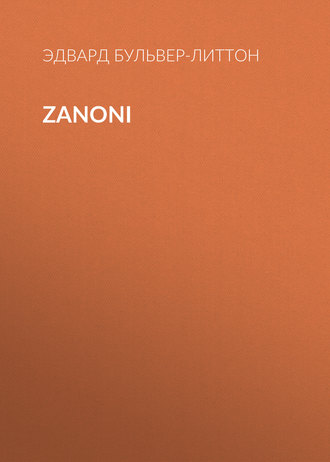
Эдвард Бульвер-Литтон
Zanoni
“Ha, ha!” said Cetoxa, laughing, “our good Loredano is envious of my diamond. Gentlemen, you sup with me to-night. I assure you I never met a more delightful, sociable, entertaining person, than my dear friend the Signor Zanoni.”
CHAPTER 1.V
Quello Ippogifo, grande e strano augello
Lo porta via.
“Orlando Furioso,” c. vi. xviii.
(That hippogriff, great and marvellous bird, bears him away.)
And now, accompanying this mysterious Zanoni, am I compelled to bid a short farewell to Naples. Mount behind me,—mount on my hippogriff, reader; settle yourself at your ease. I bought the pillion the other day of a poet who loves his comfort; it has been newly stuffed for your special accommodation. So, so, we ascend! Look as we ride aloft,—look!—never fear, hippogriffs never stumble; and every hippogriff in Italy is warranted to carry elderly gentlemen,—look down on the gliding landscapes! There, near the ruins of the Oscan’s old Atella, rises Aversa, once the stronghold of the Norman; there gleam the columns of Capua, above the Vulturnian Stream. Hail to ye, cornfields and vineyards famous for the old Falernian! Hail to ye, golden orange-groves of Mola di Gaeta! Hail to ye, sweet shrubs and wild flowers, omnis copia narium, that clothe the mountain-skirts of the silent Lautulae! Shall we rest at the Volscian Anxur,—the modern Terracina,—where the lofty rock stands like the giant that guards the last borders of the southern land of love? Away, away! and hold your breath as we flit above the Pontine Marshes. Dreary and desolate, their miasma is to the gardens we have passed what the rank commonplace of life is to the heart when it has left love behind.
Mournful Campagna, thou openest on us in majestic sadness. Rome, seven-hilled Rome! receive us as Memory receives the way-worn; receive us in silence, amidst ruins! Where is the traveller we pursue? Turn the hippogriff loose to graze: he loves the acanthus that wreathes round yon broken columns. Yes, that is the arch of Titus, the conqueror of Jerusalem,—that the Colosseum! Through one passed the triumph of the deified invader; in one fell the butchered gladiators. Monuments of murder, how poor the thoughts, how mean the memories ye awaken, compared with those that speak to the heart of man on the heights of Phyle, or by thy lone mound, grey Marathon! We stand amidst weeds and brambles and long waving herbage. Where we stand reigned Nero,—here were his tessellated floors; here,
“Mighty in the heaven, a second heaven,”
hung the vault of his ivory roofs; here, arch upon arch, pillar on pillar, glittered to the world the golden palace of its master,—the Golden House of Nero. How the lizard watches us with his bright, timorous eye! We disturb his reign. Gather that wild flower: the Golden House is vanished, but the wild flower may have kin to those which the stranger’s hand scattered over the tyrant’s grave; see, over this soil, the grave of Rome, Nature strews the wild flowers still!
In the midst of this desolation is an old building of the middle ages. Here dwells a singular recluse. In the season of the malaria the native peasant flies the rank vegetation round; but he, a stranger and a foreigner, no associates, no companions, except books and instruments of science. He is often seen wandering over the grass-grown hills, or sauntering through the streets of the new city, not with the absent brow and incurious air of students, but with observant piercing eyes that seem to dive into the hearts of the passers-by. An old man, but not infirm,—erect and stately, as if in his prime. None know whether he be rich or poor. He asks no charity, and he gives none,—he does no evil, and seems to confer no good. He is a man who appears to have no world beyond himself; but appearances are deceitful, and Science, as well as Benevolence, lives in the Universe. This abode, for the first time since thus occupied, a visitor enters. It is Zanoni.
You observe those two men seated together, conversing earnestly. Years long and many have flown away since they met last,—at least, bodily, and face to face. But if they are sages, thought can meet thought, and spirit spirit, though oceans divide the forms. Death itself divides not the wise. Thou meetest Plato when thine eyes moisten over the Phaedo. May Homer live with all men forever!
They converse; they confess to each other; they conjure up the past, and repeople it; but note how differently do such remembrances affect the two. On Zanoni’s face, despite its habitual calm, the emotions change and go. HE has acted in the past he surveys; but not a trace of the humanity that participates in joy and sorrow can be detected on the passionless visage of his companion; the past, to him, as is now the present, has been but as Nature to the sage, the volume to the student,—a calm and spiritual life, a study, a contemplation.
From the past they turn to the future. Ah! at the close of the last century, the future seemed a thing tangible,—it was woven up in all men’s fears and hopes of the present.
At the verge of that hundred years, Man, the ripest born of Time,
(“An des Jahrhunderts Neige, Der reifste Sohn der Zeit.” “Die Kunstler.”)
stood as at the deathbed of the Old World, and beheld the New Orb, blood-red amidst cloud and vapour,—uncertain if a comet or a sun. Behold the icy and profound disdain on the brow of the old man,—the lofty yet touching sadness that darkens the glorious countenance of Zanoni. Is it that one views with contempt the struggle and its issue, and the other with awe or pity? Wisdom contemplating mankind leads but to the two results,—compassion or disdain. He who believes in other worlds can accustom himself to look on this as the naturalist on the revolutions of an ant-hill, or of a leaf. What is the Earth to Infinity,—what its duration to the Eternal? Oh, how much greater is the soul of one man than the vicissitudes of the whole globe! Child of heaven, and heir of immortality, how from some star hereafter wilt thou look back on the ant-hill and its commotions, from Clovis to Robespierre, from Noah to the Final Fire. The spirit that can contemplate, that lives only in the intellect, can ascend to its star, even from the midst of the burial-ground called Earth, and while the sarcophagus called Life immures in its clay the everlasting!
But thou, Zanoni,—thou hast refused to live ONLY in the intellect; thou hast not mortified the heart; thy pulse still beats with the sweet music of mortal passion; thy kind is to thee still something warmer than an abstraction,—thou wouldst look upon this Revolution in its cradle, which the storms rock; thou wouldst see the world while its elements yet struggle through the chaos!
Go!
CHAPTER 1.VI
Precepteurs ignorans de ce faible univers.—Voltaire.
(Ignorant teachers of this weak world.)
Nous etions a table chez un de nos confreres a l’Academie, Grand Seigneur et homme d’esprit.—La Harpe.
(We supped with one of our confreres of the Academy,—a great nobleman and wit.)
One evening, at Paris, several months after the date of our last chapter, there was a reunion of some of the most eminent wits of the time, at the house of a personage distinguished alike by noble birth and liberal accomplishments. Nearly all present were of the views that were then the mode. For, as came afterwards a time when nothing was so unpopular as the people, so that was the time when nothing was so vulgar as aristocracy. The airiest fine gentleman and the haughtiest noble prated of equality, and lisped enlightenment.
Among the more remarkable guests were Condorcet, then in the prime of his reputation, the correspondent of the king of Prussia, the intimate of Voltaire, the member of half the academies of Europe,—noble by birth, polished in manners, republican in opinions. There, too, was the venerable Malesherbes, “l’amour et les delices de la Nation.” (The idol and delight of the nation (so-called by his historian, Gaillard).) There Jean Silvain Bailly, the accomplished scholar,—the aspiring politician. It was one of those petits soupers for which the capital of all social pleasures was so renowned. The conversation, as might be expected, was literary and intellectual, enlivened by graceful pleasantry. Many of the ladies of that ancient and proud noblesse—for the noblesse yet existed, though its hours were already numbered—added to the charm of the society; and theirs were the boldest criticisms, and often the most liberal sentiments.
Vain labour for me—vain labour almost for the grave English language—to do justice to the sparkling paradoxes that flew from lip to lip. The favourite theme was the superiority of the moderns to the ancients. Condorcet on this head was eloquent, and to some, at least, of his audience, most convincing. That Voltaire was greater than Homer few there were disposed to deny. Keen was the ridicule lavished on the dull pedantry which finds everything ancient necessarily sublime.
“Yet,” said the graceful Marquis de —, as the champagne danced to his glass, “more ridiculous still is the superstition that finds everything incomprehensible holy! But intelligence circulates, Condorcet; like water, it finds its level. My hairdresser said to me this morning, ‘Though I am but a poor fellow, I believe as little as the finest gentleman!’” “Unquestionably, the great Revolution draws near to its final completion,—a pas de geant, as Montesquieu said of his own immortal work.”
Then there rushed from all—wit and noble, courtier and republican—a confused chorus, harmonious only in its anticipation of the brilliant things to which “the great Revolution” was to give birth. Here Condrocet is more eloquent than before.
“Il faut absolument que la Superstition et le Fanatisme fassent place a la Philosophie. (It must necessarily happen that superstition and fanaticism give place to philosophy.) Kings persecute persons, priests opinion. Without kings, men must be safe; and without priests, minds must be free.”
“Ah,” murmured the marquis, “and as ce cher Diderot has so well sung,—
‘Et des boyaux du dernier pretre Serrez le cou du dernier roi.’”
(And throttle the neck of the last king with the string from the bowels of the last priest.)
“And then,” resumed Condorcet,—“then commences the Age of Reason!—equality in instruction, equality in institutions, equality in wealth! The great impediments to knowledge are, first, the want of a common language; and next, the short duration of existence. But as to the first, when all men are brothers, why not a universal language? As to the second, the organic perfectibility of the vegetable world is undisputed, is Nature less powerful in the nobler existence of thinking man? The very destruction of the two most active causes of physical deterioration—here, luxurious wealth; there, abject penury,—must necessarily prolong the general term of life. (See Condorcet’s posthumous work on the Progress of the Human Mind.—Ed.) The art of medicine will then be honoured in the place of war, which is the art of murder: the noblest study of the acutest minds will be devoted to the discovery and arrest of the causes of disease. Life, I grant, cannot be made eternal; but it may be prolonged almost indefinitely. And as the meaner animal bequeaths its vigour to its offspring, so man shall transmit his improved organisation, mental and physical, to his sons. Oh, yes, to such a consummation does our age approach!”
The venerable Malesherbes sighed. Perhaps he feared the consummation might not come in time for him. The handsome Marquis de – and the ladies, yet handsomer than he, looked conviction and delight.
But two men there were, seated next to each other, who joined not in the general talk: the one a stranger newly arrived in Paris, where his wealth, his person, and his accomplishments, had already made him remarked and courted; the other, an old man, somewhere about seventy,—the witty and virtuous, brave, and still light-hearted Cazotte, the author of “Le Diable Amoureux.”
These two conversed familiarly, and apart from the rest, and only by an occasional smile testified their attention to the general conversation.
“Yes,” said the stranger,—“yes, we have met before.”
“I thought I could not forget your countenance; yet I task in vain my recollections of the past.”
“I will assist you. Recall the time when, led by curiosity, or perhaps the nobler desire of knowledge, you sought initiation into the mysterious order of Martines de Pasqualis.”
(It is so recorded of Cazotte. Of Martines de Pasqualis little is known; even the country to which he belonged is matter of conjecture. Equally so the rites, ceremonies, and nature of the cabalistic order he established. St. Martin was a disciple of the school, and that, at least, is in its favour; for in spite of his mysticism, no man more beneficent, generous, pure, and virtuous than St. Martin adorned the last century. Above all, no man more distinguished himself from the herd of sceptical philosophers by the gallantry and fervour with which he combated materialism, and vindicated the necessity of faith amidst a chaos of unbelief. It may also be observed, that Cazotte, whatever else he learned of the brotherhood of Martines, learned nothing that diminished the excellence of his life and the sincerity of his religion. At once gentle and brave, he never ceased to oppose the excesses of the Revolution. To the last, unlike the Liberals of his time, he was a devout and sincere Christian. Before his execution, he demanded a pen and paper to write these words: “Ma femme, mes enfans, ne me pleurez pas; ne m’oubliez pas, mais souvenez-vous surtout de ne jamais offenser Dieu.” (“My wife, my children, weep not for me; forget me not, but remember above everything never to offend God.)—Ed.)
“Ah, is it possible! You are one of that theurgic brotherhood?”
“Nay, I attended their ceremonies but to see how vainly they sought to revive the ancient marvels of the cabala.”
“Such studies please you? I have shaken off the influence they once had on my own imagination.”
“You have not shaken it off,” returned the stranger, bravely; “it is on you still,—on you at this hour; it beats in your heart; it kindles in your reason; it will speak in your tongue!”
And then, with a yet lower voice, the stranger continued to address him, to remind him of certain ceremonies and doctrines,—to explain and enforce them by references to the actual experience and history of his listener, which Cazotte thrilled to find so familiar to a stranger.
Gradually the old man’s pleasing and benevolent countenance grew overcast, and he turned, from time to time, searching, curious, uneasy glances towards his companion.
The charming Duchesse de G— archly pointed out to the lively guests the abstracted air and clouded brow of the poet; and Condorcet, who liked no one else to be remarked, when he himself was present, said to Cazotte, “Well, and what do YOU predict of the Revolution,—how, at least, will it affect us?”
At that question Cazotte started; his cheeks grew pale, large drops stood on his forehead; his lips writhed; his gay companions gazed on him in surprise.
“Speak!” whispered the stranger, laying his hand gently upon the arm of the old wit.
At that word Cazotte’s face grew locked and rigid, his eyes dwelt vacantly on space, and in a low, hollow voice, he thus answered
(The following prophecy (not unfamiliar, perhaps, to some of my readers), with some slight variations, and at greater length, in the text of the authority I am about to cite, is to be found in La Harpe’s posthumous works. The MS. is said to exist still in La Harpe’s handwriting, and the story is given on M. Petitot’s authority, volume i. page 62. It is not for me to enquire if there be doubts of its foundation on fact.—Ed.),—
“You ask how it will affect yourselves,—you, its most learned, and its least selfish agents. I will answer: you, Marquis de Condorcet, will die in prison, but not by the hand of the executioner. In the peaceful happiness of that day, the philosopher will carry about with him not the elixir but the poison.”
“My poor Cazotte,” said Condorcet, with his gentle smile, “what have prisons, executioners, and poison to do with an age of liberty and brotherhood?”
“It is in the names of Liberty and Brotherhood that the prisons will reek, and the headsman be glutted.”
“You are thinking of priestcraft, not philosophy, Cazotte,” said Champfort.
(Champfort, one of those men of letters who, though misled by the first fair show of the Revolution, refused to follow the baser men of action into its horrible excesses, lived to express the murderous philanthropy of its agents by the best bon mot of the time. Seeing written on the walls, “Fraternite ou la Mort,” he observed that the sentiment should be translated thus, “Sois mon frere, ou je te tue.” (“Be my brother, or I kill thee.”)) “And what of me?”
“You will open your own veins to escape the fraternity of Cain. Be comforted; the last drops will not follow the razor. For you, venerable Malesherbes; for you, Aimar Nicolai; for you, learned Bailly,—I see them dress the scaffold! And all the while, O great philosophers, your murderers will have no word but philosophy on their lips!”
The hush was complete and universal when the pupil of Voltaire—the prince of the academic sceptics, hot La Harpe—cried with a sarcastic laugh, “Do not flatter me, O prophet, by exemption from the fate of my companions. Shall I have no part to play in this drama of your fantasies.”
At this question, Cazotte’s countenance lost its unnatural expression of awe and sternness; the sardonic humour most common to it came back and played in his brightening eyes.
“Yes, La Harpe, the most wonderful part of all! YOU will become—a Christian!”
This was too much for the audience that a moment before seemed grave and thoughtful, and they burst into an immoderate fit of laughter, while Cazotte, as if exhausted by his predictions, sank back in his chair, and breathed hard and heavily.
“Nay,” said Madame de G—, “you who have predicted such grave things concerning us, must prophesy something also about yourself.”
A convulsive tremor shook the involuntary prophet,—it passed, and left his countenance elevated by an expression of resignation and calm. “Madame,” said he, after a long pause, “during the siege of Jerusalem, we are told by its historian that a man, for seven successive days, went round the ramparts, exclaiming, ‘Woe to thee, Jerusalem,—woe to myself!’”
“Well, Cazotte, well?”
“And on the seventh day, while he thus spoke, a stone from the machines of the Romans dashed him into atoms!”
With these words, Cazotte rose; and the guests, awed in spite of themselves, shortly afterwards broke up and retired.
CHAPTER 1.VII
Qui donc t’a donne la mission s’annoncer au peuple que la divinite n’existe pas? Quel avantage trouves-tu a persuader a l’homme qu’une force aveugle preside a ses destinees et frappe au hasard le crime et la vertu?—Robespierre, “Discours,” Mai 7, 1794.
(Who then invested you with the mission to announce to the people that there is no God? What advantage find you in persuading man that nothing but blind force presides over his destinies, and strikes haphazard both crime and virtue?)
It was some time before midnight when the stranger returned home. His apartments were situated in one of those vast abodes which may be called an epitome of Paris itself,—the cellars rented by mechanics, scarcely removed a step from paupers, often by outcasts and fugitives from the law, often by some daring writer, who, after scattering amongst the people doctrines the most subversive of order, or the most libellous on the characters of priest, minister, and king, retired amongst the rats, to escape the persecution that attends the virtuous; the ground-floor occupied by shops; the entresol by artists; the principal stories by nobles; and the garrets by journeymen or grisettes.
As the stranger passed up the stairs, a young man of a form and countenance singularly unprepossessing emerged from a door in the entresol, and brushed beside him. His glance was furtive, sinister, savage, and yet timorous; the man’s face was of an ashen paleness, and the features worked convulsively. The stranger paused, and observed him with thoughtful looks, as he hurried down the stairs. While he thus stood, he heard a groan from the room which the young man had just quitted; the latter had pulled to the door with hasty vehemence, but some fragment, probably of fuel, had prevented its closing, and it now stood slightly ajar; the stranger pushed it open and entered. He passed a small anteroom, meanly furnished, and stood in a bedchamber of meagre and sordid discomfort. Stretched on the bed, and writhing in pain, lay an old man; a single candle lit the room, and threw its feeble ray over the furrowed and death-like face of the sick person. No attendant was by; he seemed left alone, to breathe his last. “Water,” he moaned feebly,—“water:—I parch,—I burn!” The intruder approached the bed, bent over him, and took his hand. “Oh, bless thee, Jean, bless thee!” said the sufferer; “hast thou brought back the physician already? Sir, I am poor, but I can pay you well. I would not die yet, for that young man’s sake.” And he sat upright in his bed, and fixed his dim eyes anxiously on his visitor.
“What are your symptoms, your disease?”
“Fire, fire, fire in the heart, the entrails: I burn!”
“How long is it since you have taken food?”
“Food! only this broth. There is the basin, all I have taken these six hours. I had scarce drunk it ere these pains began.”
The stranger looked at the basin; some portion of the contents was yet left there.
“Who administered this to you?”
“Who? Jean! Who else should? I have no servant,—none! I am poor, very poor, sir. But no! you physicians do not care for the poor. I AM RICH! can you cure me?”
“Yes, if Heaven permit. Wait but a few moments.”
The old man was fast sinking under the rapid effects of poison. The stranger repaired to his own apartments, and returned in a few moments with some preparation that had the instant result of an antidote. The pain ceased, the blue and livid colour receded from the lips; the old man fell into a profound sleep. The stranger drew the curtains round the bed, took up the light, and inspected the apartment. The walls of both rooms were hung with drawings of masterly excellence. A portfolio was filled with sketches of equal skill,—but these last were mostly subjects that appalled the eye and revolted the taste: they displayed the human figure in every variety of suffering,—the rack, the wheel, the gibbet; all that cruelty has invented to sharpen the pangs of death seemed yet more dreadful from the passionate gusto and earnest force of the designer. And some of the countenances of those thus delineated were sufficiently removed from the ideal to show that they were portraits; in a large, bold, irregular hand was written beneath these drawings, “The Future of the Aristocrats.” In a corner of the room, and close by an old bureau, was a small bundle, over which, as if to hide it, a cloak was thrown carelessly. Several shelves were filled with books; these were almost entirely the works of the philosophers of the time,—the philosophers of the material school, especially the Encyclopedistes, whom Robespierre afterwards so singularly attacked when the coward deemed it unsafe to leave his reign without a God.
(“Cette secte (les Encyclopedistes) propagea avec beaucoup de zele l’opinion du materialisme, qui prevalut parmi les grands et parmi les beaux esprits; on lui doit en partie cette espece de philosophie pratique qui, reduisant l’Egoisme en systeme regarde la societe humaine comme une guerre de ruse, le succes comme la regle du juste et de l’injuste, la probite comme une affaire de gout, ou de bienseance, le monde comme le patrimoine des fripons adroits.”—“Discours de Robespierre,” Mai 7, 1794. (This sect (the Encyclopaedists) propagate with much zeal the doctrine of materialism, which prevails among the great and the wits; we owe to it partly that kind of practical philosophy which, reducing Egotism to a system, looks upon society as a war of cunning; success the rule of right and wrong, honesty as an affair of taste or decency: and the world as the patrimony of clever scoundrels.))
A volume lay on a table,—it was one of Voltaire, and the page was opened at his argumentative assertion of the existence of the Supreme Being. (“Histoire de Jenni.”) The margin was covered with pencilled notes, in the stiff but tremulous hand of old age; all in attempt to refute or to ridicule the logic of the sage of Ferney: Voltaire did not go far enough for the annotator! The clock struck two, when the sound of steps was heard without. The stranger silently seated himself on the farther side of the bed, and its drapery screened him, as he sat, from the eyes of a man who now entered on tiptoe; it was the same person who had passed him on the stairs. The new-comer took up the candle and approached the bed. The old man’s face was turned to the pillow; but he lay so still, and his breathing was so inaudible, that his sleep might well, by that hasty, shrinking, guilty glance, be mistaken for the repose of death. The new-comer drew back, and a grim smile passed over his face: he replaced the candle on the table, opened the bureau with a key which he took from his pocket, and loaded himself with several rouleaus of gold that he found in the drawers. At this time the old man began to wake. He stirred, he looked up; he turned his eyes towards the light now waning in its socket; he saw the robber at his work; he sat erect for an instant, as if transfixed, more even by astonishment than terror. At last he sprang from his bed.
“Just Heaven! do I dream! Thou—thou—thou, for whom I toiled and starved!—THOU!”
The robber started; the gold fell from his hand, and rolled on the floor.
“What!” he said, “art thou not dead yet? Has the poison failed?”
“Poison, boy! Ah!” shrieked the old man, and covered his face with his hands; then, with sudden energy, he exclaimed, “Jean! Jean! recall that word. Rob, plunder me if thou wilt, but do not say thou couldst murder one who only lived for thee! There, there, take the gold; I hoarded it but for thee. Go! go!” and the old man, who in his passion had quitted his bed, fell at the feet of the foiled assassin, and writhed on the ground,—the mental agony more intolerable than that of the body, which he had so lately undergone. The robber looked at him with a hard disdain. “What have I ever done to thee, wretch?” cried the old man,—“what but loved and cherished thee? Thou wert an orphan,—an outcast. I nurtured, nursed, adopted thee as my son. If men call me a miser, it was but that none might despise thee, my heir, because Nature has stunted and deformed thee, when I was no more. Thou wouldst have had all when I was dead. Couldst thou not spare me a few months or days,—nothing to thy youth, all that is left to my age? What have I done to thee?”
“Thou hast continued to live, and thou wouldst make no will.”
“Mon Dieu! Mon Dieu!”
“TON DIEU! Thy God! Fool! Hast thou not told me, from my childhood, that there is NO God? Hast thou not fed me on philosophy? Hast thou not said, ‘Be virtuous, be good, be just, for the sake of mankind: but there is no life after this life’? Mankind! why should I love mankind? Hideous and misshapen, mankind jeer at me as I pass the streets. What hast thou done to me? Thou hast taken away from me, who am the scoff of this world, the hopes of another! Is there no other life? Well, then, I want thy gold, that at least I may hasten to make the best of this!”
“Monster! Curses light on thy ingratitude, thy—”
“And who hears thy curses? Thou knowest there is no God! Mark me; I have prepared all to fly. See,—I have my passport; my horses wait without; relays are ordered. I have thy gold.” (And the wretch, as he spoke, continued coldly to load his person with the rouleaus). “And now, if I spare thy life, how shall I be sure that thou wilt not inform against mine?” He advanced with a gloomy scowl and a menacing gesture as he spoke.
The old man’s anger changed to fear. He cowered before the savage. “Let me live! let me live!—that—that—”
“That—what?”
“I may pardon thee! Yes, thou hast nothing to fear from me. I swear it!”
“Swear! But by whom and what, old man? I cannot believe thee, if thou believest not in any God! Ha, ha! behold the result of thy lessons.”
Another moment and those murderous fingers would have strangled their prey. But between the assassin and his victim rose a form that seemed almost to both a visitor from the world that both denied,—stately with majestic strength, glorious with awful beauty.
The ruffian recoiled, looked, trembled, and then turned and fled from the chamber. The old man fell again to the ground insensible.



